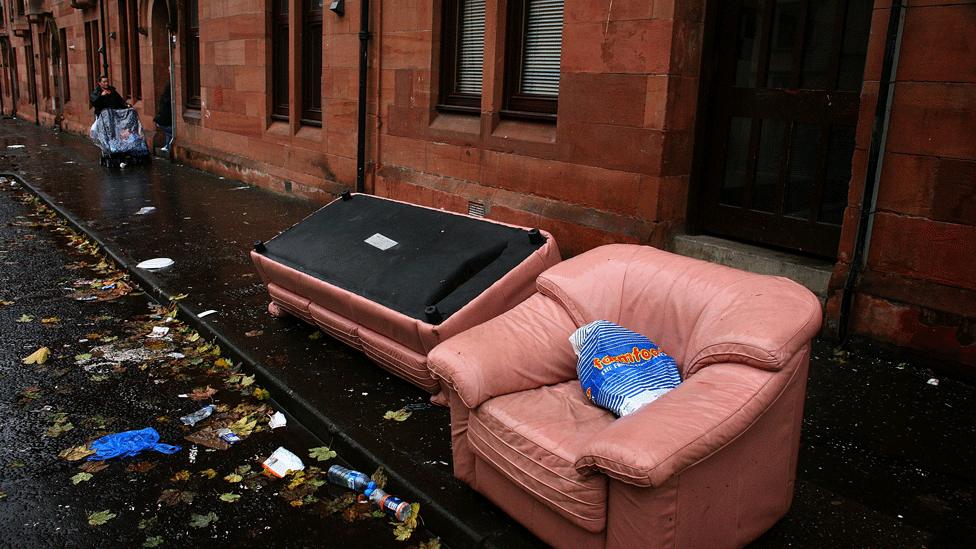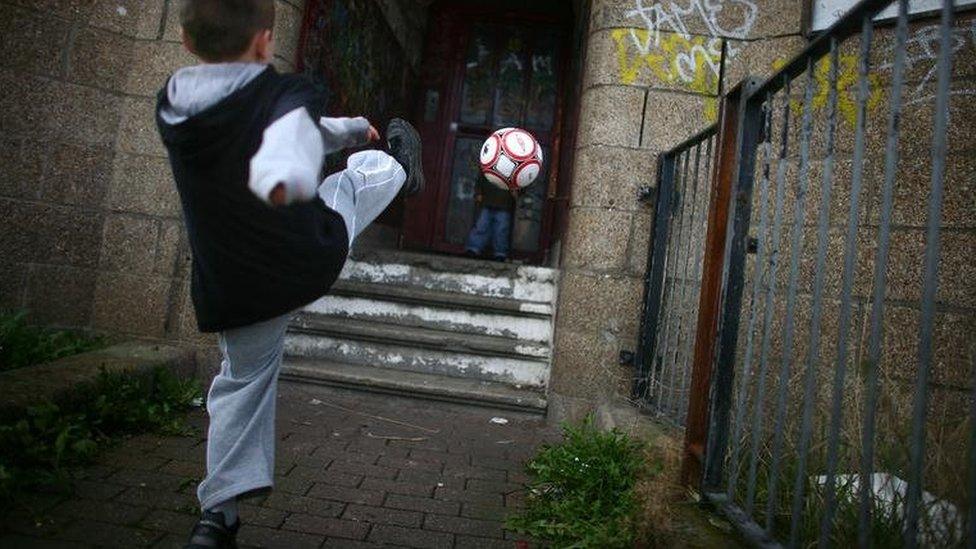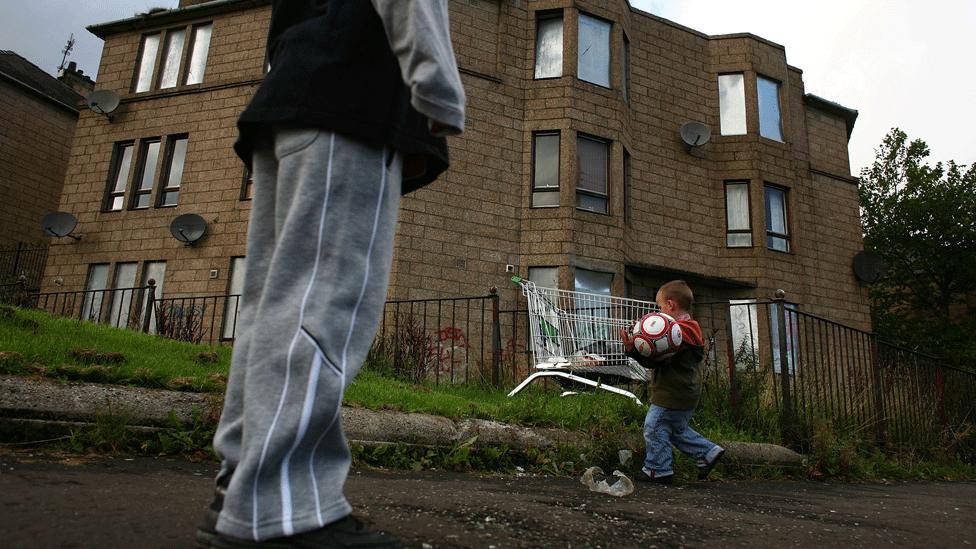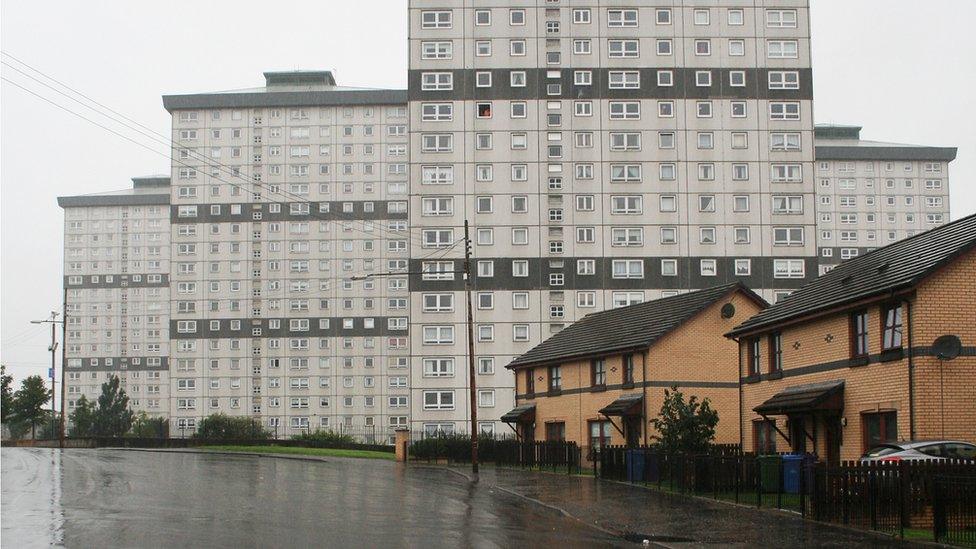Poverty and inequality on the rise in Scotland
- Published

After adding in housing costs official figures revealed one million people in Scotland live in poverty
Poverty rates in Scotland are continuing to rise, official figures have suggested.
In each year between 2014 and 2017, one million people in Scotland, external were living in poverty, which was up slightly on previous years.
The latest statistics also show 8% of people are in "persistent poverty".
The Scottish government said it was "absolutely committed" to ending poverty and would set out its plan to eradicate child poverty by 2030.
Equalities minister Angela Constance said addressing inequalities was "at the core of everything we do to make Scotland a fairer, more equal country".
She added: "These figures show the scale of the challenge we face, which is why we are committed to actions that make life better now as well as driving long-term change."
The statistics, released on Thursday, also revealed:
poverty rates for single adult women were higher than for single adult men, whether or not they had children
poverty rates for minority ethnic groups were higher than for the white ethnic group
poverty rates for families with a disabled member were higher than for families without
after housing costs, 24% of children in Scotland were living in relative poverty in 2014-17, up 1% on 2013-16
and after housing costs, relative pensioner poverty was 13%, up 1% on the previous three-year period.
Ms Constance said the Scottish government was doing what it could but "UK government cuts and continuing austerity" meant that it was having to fight poverty "with one hand tied behind our back".
She added: "That will not stop us continuing to be determined to tackle poverty and we will publish our Tackling Child Poverty Delivery Plan next week which will deliver strong actions to reduce the number of families living in poverty."
Alexander Cadona says poverty has meant he only eats twice a week and he never buys new clothes
A UK government spokeswoman said the good news was that absolute poverty was a record low and employment rates were on the rise.
She added; "We know there is more to do to ensure that every child gets the very best chances in life.
"Our welfare reforms offer parents tailored support to move into work, ensuring that even more families can enjoy the opportunities and benefits that work can bring."
How is poverty defined?
Relative poverty is a measure of whether the income of the poorest households are keeping pace with middle income households across the UK. Income is measured after tax and includes social security payments. If the household's income is below the poverty threshold, all people within the household are in poverty. Persistent poverty identifies the number of individuals living in relative poverty for three or more of the last four years. Absolute poverty is a measure of whether the incomes of the poorest households are keeping pace with inflation.
What's the reaction to the figures?
Scottish Labour's inequalities spokeswoman, Elaine Smith, said no one in 21st century Scotland should have to live in poverty. She added: "It is simply unacceptable that one in five people and one in four children are forced to live in poverty. That is why Labour proposed using the powers of the Scottish Parliament to top-up child benefit and immediately lift 30,000 children out of poverty - but the SNP is joining with the Tories to block it."
The Scottish Greens said these latest statistics showed that inequalities in income were getting deeper. Green MSP Alison Johnstone urged change, adding: "Throughout the Social Security Bill and Child Poverty Act, the Scottish Greens have pushed for measures that will make a real difference to people's pockets. Topping up child benefit by £5 a week would lift 30,000 children out of poverty and my amendments to the Child Poverty Act made sure the government has to consider this in every Child Poverty Delivery Plan."
The director of Shelter Scotland, Graeme Brown, said that it was "simply wrong" that in Scotland child poverty was on the rise. He urged the Scottish government to bring forward its date for cutting child poverty. He added: "That's a long time to wait for a lot of children who need to see action now."
The Scottish Conservative's Annie Wells said that despite the rhetoric the SNP had not only failed to reduce child poverty "but under their watch it has actively increased". She added: "The fact is that child poverty has now been rising for several years, which demonstrates the failure of SNP policies to understand and address the complex causes of child poverty. The current targets on child poverty are ambitious and we truly hope that these targets can be met but the SNP's approach to child poverty is not working."
Caron Lindsay of the Scottish Liberal Democrats said it was "scandalous" that a million people in Scotland were living in poverty. She added: "Education is the best route into high-skill, high-wage work, while good mental health enables people to achieve their potential. The failure to invest in these areas has seen our education system slipping and people waiting years for the treatment they desperately need. That does nothing to help people get on in life."
- Published24 January 2018

- Published26 February 2018

- Published15 March 2018
